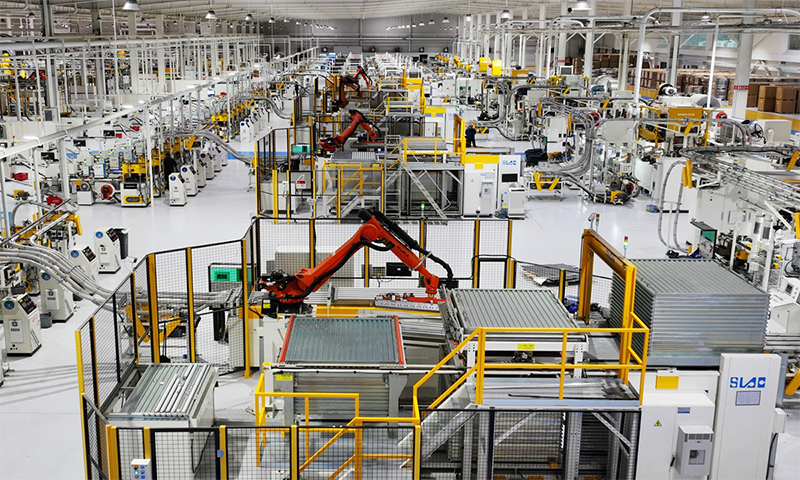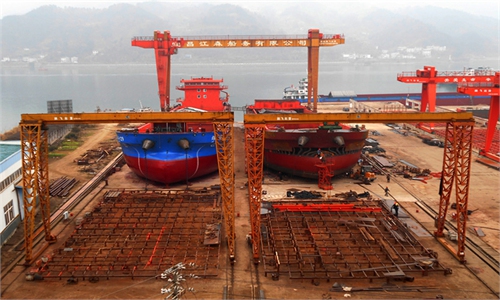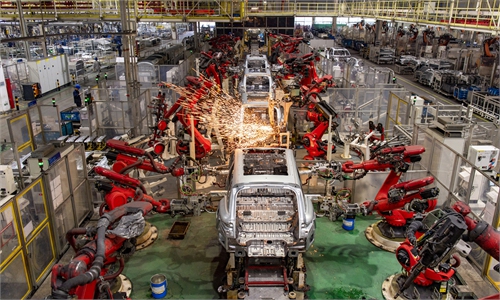Top-level Chinese meeting urges digital transformation of manufacturing sector as economy continues steady recovery
Move set to spark effective demand, improve expectations to boost economic recovery

Industrial robots are operating on an intelligent production line in a smart manufacturing enterprise in Yangzhou, East China's Jiangsu Province. Photo: VCG
A top-level Chinese meeting held on Saturday adopted an action plan on the digital transformation of the manufacturing sector, as policymakers are promoting the deep integration of digital technology and the manufacturing sector to strengthen the standing and international competitiveness of China's manufacturing sector and transform the country into a manufacturing power.
Industry analysts said the digitalization of the manufacturing sector is an important path for the development of new quality productive forces, and will greatly spark effective demand and improve market expectations to consolidate the fundamentals of the Chinese economy and its continuous recovery.
A State Council executive meeting studied work on effectively lowering logistics costs, reviewed and adopted an action plan on the digital transformation of the manufacturing sector, the Xinhua News Agency reported.
The digital transformation of the manufacturing sector is key to advancing new industrialization and the building of a modernized industrial system, the meeting pointed out, calling for efforts to accelerate breakthroughs in core technologies and boost the application of technological achievements.
The meeting called for efforts to scale up support for the digital shift of small and medium-sized enterprises (SMEs), optimize public service platforms, and establish a long-term mechanism for boosting the digital transformation of SMEs, it said.
"Digitalization is a crucial move to improve the resilience and security of China's industrial and supply chains to ensure its position as the 'world's factory,' while boosting the development of a new industrial system and accelerate the nation's development into a manufacturing powerhouse," Jiao Xinwang, director of the China Manufacturing Think Tank, told the Global Times on Sunday.
With smart manufacturing as a main development direction and the industrial internet as a key path, China has stepped up efforts to promote the automation and information transformation of traditional manufacturers, and made notable achievements in some areas such as the industrial internet, Jiao noted.
The digital transformation of the manufacturing sector will be promoted at scale in 2024, with the construction of intelligent factories by large enterprises and digitalization in SMEs being boosted.
The industrial internet is an example. The scale of the industrial internet is expected to exceed 1.5 trillion yuan ($211.55 billion) this year, a growth of about 13 percent, the Economic Information Daily reported in January, citing the China Academy of Information and Communications Technology, a think tank.
Hengtong Fiber Optic Technology Co, based in East China Jiangsu Province, is an optical fiber and electricity fiber manufacturer. Faced with challenges, the company has actively engaged in digital transformation and intelligent manufacturing to adapt to evolving production patterns.
"Overcoming technological barriers from the West, we have successfully developed technologies for producing fiber preform with independent intellectual property rights," Liu Zhenhua, general manager of the company, told the Global Times.
By adopting digital technologies and intelligent manufacturing, our production efficiency and product quality have improved while production costs have been lowered remarkably, Liu said.
Longi Green Energy Technology Co, one of the world's leading suppliers of solar photovoltaic (PV) solutions, told the Global Times that the introduction of domestically developed diamond-tipped wire saw cutting technology has boosted the advance of the global PV industry and reduced costs.
Boasting the most complete and largest industrial system on the planet, strong manufacturing capabilities and supporting facilities, China's manufacturing sector has shown great resilience in accommodating to changes, resisting risks and adjusting production capacity. Empowering the transformation and upgrading of manufacturing industries will push the real economy to a new level and provide solid support for the country's high-quality development, analysts said.
"The digitalization of the manufacturing sector is an important way to develop new quality productive forces. Compared with high investment in technological innovations, digital transformation requires less investment, and thus it's more cost-effective for enterprises," Pan Helin, a member of the Expert Committee for Information and Communication Economy under the Ministry of Industry and Information Technology, told the Global Times.
However, some SMEs face shortages of resources for making a digital transformation. In this regard, targeted policies are needed to support their digitalization and help build new growth momentum and enhance their competitiveness, Pan said.
Wen Bin, chief economist at China Minsheng Bank, told the Global Times that the country's monetary policy will continue to focus on "precision and effectiveness," including the use of a special relending facility of 500 billion yuan to support sci-tech innovation, technical transformation and equipment renewal.
In the first quarter, China's value-added industrial output went up by 6.1 percent year-on-year, showing a notable increase compared with the corresponding period and the fourth quarter in 2023. Over the period, the industrial sector generated 37.3 percent of China's GDP, official data showed.



